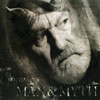ROY HARPER : MAN & MYTH
- The Enemy
- Time Is Temporary
- January Man
- The Stranger
- Cloud Cuckooland
- Heaven Is Here
- The Exile
Label : Bella Union
Release Year : 2013
Length : 51:29
Review (AllMusic) : Roy Harper, loved as he is by everyone from Page & Plant and Kate Bush to Joanna Newsom and Jonathan Wilson, has always existed as a shadow in the hallway of the music business, rather than a presence than its living room. He's also been misunderstood by critics more often than not. He is a poet who happens to play a very decent guitar and write fine melodies. His lyrics have never concerned themselves with fashionable topics. They have been as rooted in the past - the historical as well as his own - as they are in his perceived present. Man & Myth is his first new studio album since 2000's The Green Man. It was recorded in California with Wilson and in Ireland with the venerable John Fitzgerald, both of whom play on these well-populated recordings, as well. Composed of seven new songs, this is Harper, aged 72, in pristine voice, his trademark off-meter phrasing intact. Throughout, he makes no attempt to change anything about what he does. The sounds remain rooted in 1967's Sophisticated Beggar, yet move toward another frontier, albeit with elegant arrangements and crisp yet warm production. His voice and guitar are consistently atop a slew of other instruments, including Pete Townshend's guitar on two tracks. Harper's writing remains keen and opulent, his loopy phrasing and lyrics lie in their own country; they exist outside of the usual singer/songwriter tropes. Opener "The Enemy" is sparse in its charts, but rich in metaphors and metamorphoses as it details the fading notion of romanticism in the post-World War II era in the British Isles. "January Man" looks back at lost love as if it were an inevitability, as its protagonist seeks shelter inside its memory, yet is too smart to believe there is one. Adorned by strings and brass, it's Harper at his most graceful and vulnerable. "Cloud Cuckooland" is a rocker buoyed by Townshend's lead guitar (the most aggressive he's played in decades), rolling snares, and Harper's cleverly and scathingly satirizing citing the 21st century's embrace of corporate culture even as it ushers in its nadir and death. "Heaven Is Here" is the set's masterpiece. Clocking in at nearly 16 minutes, it's his look through the history of myth as a snapshot of the present. It's simultaneously elegiac, romantic, literary, and elliptical as it moves through a visionary dream - one equally inhabited by the spirits of Dante, Virgil, Milton, and Yeats. His melismatic phrasing is as musical as the gorgeous strings, guitars, drums, and mellotrons in the sonic architecture framing his voice. Man & Myth is Harper at his best, fully in command of his vision, his curious, lovely melodic sensibility, and, of course, his poetry.
Review (Rootstime) : Wonderkind Roy Harper, die in de sixties als Britse folk- en rockzanger aan een vruchtbare en avontuurlijke carrière begon, leek zich de laatste jaren even in een hoekje in Ierland te willen verschuilen, maar zijn inspiratie bleef broeien en zijn productiviteit bleef werkzaam. Hij schreef poëzie, essays, tijdschriftartikelen en songs. En hij heeft daarnaast ook iets met mythologie. Op het bejubelde en bekroonde 'HQ' uit 1975 lijkt hij als een jonge volksheld uit de zeegolven op te duiken en in zijn laatste 'Man And Myth' met zijn doorgroefde denkerskop vereenzelvigt hij zich met de barden. Tevens wijdt hij een tweevoudige songsuite aan de tragische geschiedenis van Orpheus en Eurydice, een mythe die terug te brengen is op het metafysisch lot van de mensheid. Tussen zijn debuut 'Sophisticated Beggar' uit 1966 en dit laatste studioalbum liggen bijna vijf decennia, een periode die meer dan dertig albums omspant. Woody Guthrie, John Keats en Jack Kerouac behoorden tot zijn eerste invloeden, naast klassieke muziek en de jazzinvloeden van Miles Davis. Maar zelf inspireerde hij op zijn beurt ook menig songwriter of muzikant, te veel om op te noemen. Onlangs ontving hij nog de 'BBC Radio 2 Folk Awards Lifetime Achievement' Award. Het album 'Man & Myth' nam hij op op twee verschillende locaties: deels in Los Angeles, met als producer/muzikant Jonathan Wilson en deels in West Cork, Ierland, waar zijn vriend John Fitzgerald een studio heeft. De epische songs rijpten over de jaren heen. Langzamerhand werd Roy Harper volgens eigen zeggen één met zijn songs: hij is de minnaar, de vijand en de banneling. Met zijn gedragen, soms weeklagende dan weer berustende stem, brengt hij de beladen songs visueel tot leven. In het narratief gezongen 'Heaven Is Here' bezingt hij het lot van de Argonauten en het mythische liefdesverhaal van Orpheus. Zijn dramatische zangstijl zuigt je aan bij diens zoektocht en zijn wanhopige poging om zijn geliefde terug tot leven te wekken. Zijn noodlottig achteromkijken geldt voor Harper als een metafoor voor het leven zelf waarbij je beter niet terugblikt op wat voorbij is. Opvallend hoe Harper bezonken wijsheid en kritische aanvallen op politici of de chaotische tijdsgeest met elkaar versmelt. Het zijn de circa twintig gastmuzikanten die aan de beschouwingen en songlyriek van Roy Harper nog een extra emotionele bedding geven. Multi-instrumentalist Jonathan Wilson begeleidt met elektrische gitaar, banjo of met mandoline, zoals op het zwaarmoedige 'The Stranger', waarop ook cellisten en violisten invallen. De subtiele arrangementen geven aan de mythische context nog meer diepgang. Op het weemoedige 'January Man' wisselen spijt en verlangen elkaar af. In het rebelse 'Cloud Cuckooland' daarentegen met de fascinerende altsax van James King strijden wanhoop en verzet om de overhand. De tijd die je ontglipt, de eenzaamheid van de banneling en de eeuwige hunker naar liefde zijn de thema's die steeds weer in het integer oeuvre van Roy Harper opduiken. Met zijn unieke stem en akoestisch gitaarspel verheft hij deze tot thema's met eeuwigheidswaarde. Het bijhorend tekstboekje met expressieve foto's past hierbij als illustraties bij zijn persoonlijke odyssee.
